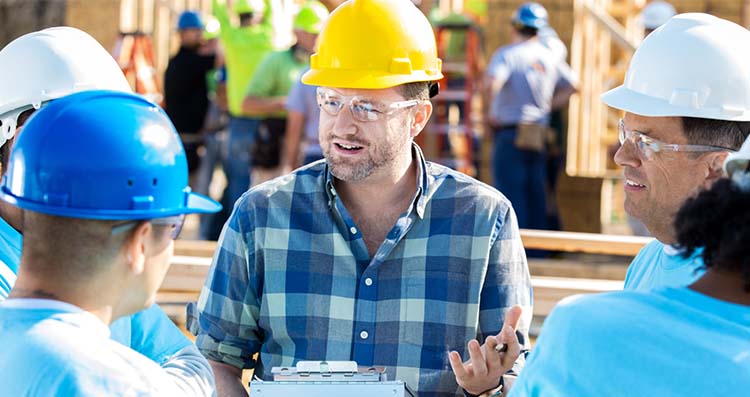Who needs to carry out basic safety training on a temporary or mobile construction site?
For temporary or mobile construction sites, the obligation to undergo basic safety training has been extended to multiple categories of workers who contribute to the actual realisation of a structure. By 15 April 2024 at the latest, everyone who is not subject to an exemption will have to have effectively completed basic safety training.
Basic safety training has been mandatory for all workers in the construction sector since 1 October 2023 (PC 124). This basic training must inform all construction workers of the risks arising from their own activities and others in their vicinity. A basic knowledge of legal prevention principles, safe behaviour on a construction site, and applying appropriate prevention measures form part of the learning package.
Basic safety training shall be repeated at regular intervals, unless the employer can demonstrate that workers' knowledge remains current, through regular or continuous training and information, and through practical experience.
The obligation for basic safety training is a consequence of the amendment to the Royal Decree of 25 January 2001 on temporary or mobile construction sites (Belgian Official Journal of 7.2.2001).

Extension of scope
Whereas the sectoral agreement initially applied only to companies under PC 124, it has since been extended to:
- Other joint committees active on site (111, 145 and PC 149.01)
- Belgian self-employed persons
- All agency employees and self-employed persons
Agency employees and self-employed persons are also covered by the obligation, unless they already have a valid certificate from another EU Member State.
A number of categories or functions are in a grey area, according to umbrella construction association Embuild. This includes, for example, working students, trainees or dual-learning students. If they perform work on a temporary or mobile construction site (TMB) that contributes to the realisation of the construction work, they are also eligible to undergo basic safety training.
In a strict sense, it is not compulsory for students as part of a spectator placement, but certainly recommended given their age and lack of experience.
Drivers delivering construction materials, drivers of concrete mixers and operators of concrete pumps are also covered by the training obligation.
Project and site managers or representatives do not qualify, insofar as they do not perform manual operations but rather exclusively intellectual work.
Exceptions to the rule
Not every worker has to undergo basic training. For example, construction workers can be exempted if they:
- Have a valid VCA certificate;
- Have already completed a construction safety training validated by Constructiv;
- Are in possession of a certificate obtained or validated by Constructiv showing they have followed a recognised basic safety training;
- Have gained at least five years of relevant experience in the past ten years;
- Have already followed the basic safety training for temporary workers in construction;
- Have obtained a valid certificate in another EU country.

From when does this rule apply?
The amendment to the RD came into force on 15 April this year. A transitional period of one year applies. This means that by 15 April 2024, everyone who is not subject to an exemption must have attended the training. In the meantime, those who join as newcomers will not get that much time. Newcomers must take the basic safety training within a month of starting their job.
After the transition period, any newcomer should ideally have received the training before starting work, or if not, within a month of starting.
Who checks that everyone has received the necessary training?
The basic rule is that every self-employed person is responsible for themselves and their staff. Non-compliance with the law may result in a sanction. But main contractors can also be held co-responsible (and thus be sanctioned) when subcontracting.